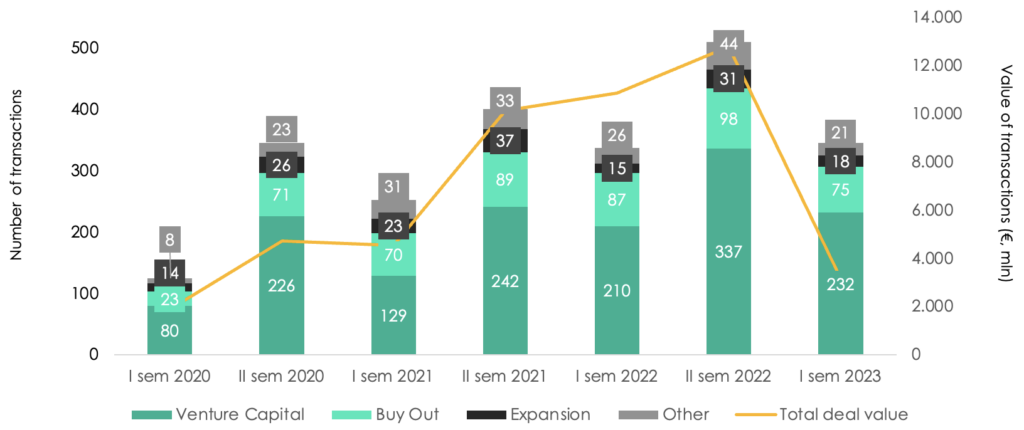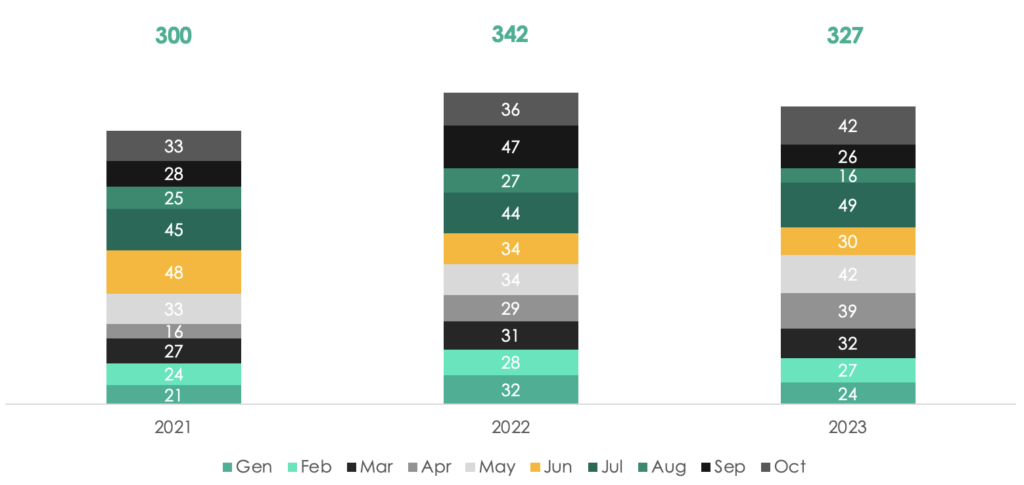2023 was a moderately eventful year for the Italian private equity industry, especially in the SMEs sector. We are witnessing a general aggregation in different sectors, while large and mega deals (acquisitions with invested equity of more than €150m) seem to have a momentary setback.
Although 2023 data are still incomplete, it is possible to draw the first conclusions. According to the report “I Semestre 2023. Il mercato italiano del private equity e venture capital”, prepared by PWC for AIFI, the first six months of the year were characterized by a substantial stability in the number of investments, compared to the same period of 2022 (346, with a slight decrease in buy-out, infrastructure, turnaround and replacement transactions).
The biggest difference is in the overall value of deals. In fact, because of the lower number of large and mega deals (8 in the first half of 2022, 3 in the first half of 2023), the value invested fell from €10.8bn to €3.1bn, a 71% drop. In particular, the greatest impact is visible on infrastructure investments (-96% vs 1H22) and buy-outs (-39% vs 1H22).

Source: AIFI, PwC Deals. I Semestre 2023: Il mercato italiano del private equity e venture capital
The report also points out that investments in the first half of 2023 are mainly concentrated in northern Italy, with Lombardia the first region in terms of total number of deals (51,4%), followed by Lazio, Emilia Romagna, Piemonte and Toscana. It is also interesting to note that operators have invested mainly in the ICT sector (31,5% of the total), followed by sectors that represent the Made in Italy, such as industrial and medical goods, but also in the energy sector, driven by investments for the green transition.
The Private Equity Monitor of the LIUC Business School allows us to have more recent data, but the trend seen in the first 6 months of the year seems to be confirmed. In fact, as of October 2023, the number of transactions is still broadly in line with the first 10 months of 2022, and well above the 2021 figures. The Observatory also found that the majority of transactions are buy-outs (88% in October alone), and that add-ons account for 60% of the total.

Source: Private Equity Monitor – PEM, LIUC Business School
It can be assumed that the decline in large and mega deals is driven both by geopolitical uncertainties, such as the war in Ukraine and, lately, the war in the Middle East, by the slowdowns still underway in global supply chains, and above all by inflation and the consequent increase in interest rates by global central banks. With the ECB and BoE raising rates to 4.5% and the Fed to 5.25%, the cost of financing large buy-outs has become too onerous for large private equity funds, which have therefore preferred lower-risk solutions.
On the other hand, the fragmentation of the Italian landscape, characterized by the presence of a large number of SMEs, has led to the activism and aggregation of different realities. The main motivation lies in the need to create more structured and integrated players, able to be more competitive on foreign markets. A second motivation lies in the need to create more solid and resilient organizations, better able to withstand times of crisis and systemic shocks, such as those experienced in the last 4 years.
The outlook for 2024 looks positive. The continued gradual decline in inflation should lead to more expansionary monetary policies by central banks, resulting in lower interest rates. However, it will likely take some time for the benefits to be reflected in the real economy. Despite this, after an initial period of adjustment, a decline in interest rates should favor the prosecution of M&A activities, and the restart of larger deals. This, coupled with investors’ growing confidence in the markets, with rallies expected next year, should create the ideal environment for the ecosystem to grow.
However, it is unlikely that negative real interest rates will be reached again, especially in the medium term. This new condition will entail the need for private equity funds to invest their capital intelligently, increasingly pursuing the value creation in a sustainable way through industrial projects. The Italian landscape offers many of these opportunities, and many sectors are already undergoing aggregation processes to create more solid realities.
It is in this process that funds can really create value for companies, for the market and for the country. Operators with a strong entrepreneurial DNA can carry out this extremely important task, providing not only capital, but also strategic skills to help companies in ambitious growth projects, creating real groups of excellence capable of competing on international markets, always enhancing the Made in Italy.
